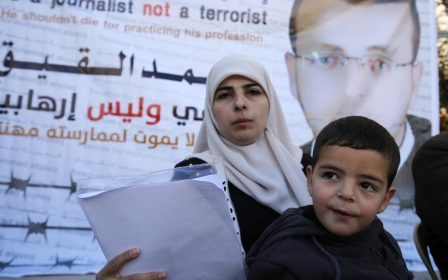Palestinian hunger-striker's challenge to Israel's detention system

The Israeli government is poised to execute the Palestinian political prisoner Mohamed Al-Qiq who has been on total hunger strike - drinking water only - since 25 November. The justification the Israelis are claiming for this decision is state security, their standard justification for the infamous mechanism known as "administrative detention".
This mechanism has enabled the government to hold Al-Qiq without charges or trial and even, despite suspension of Al-Qiq’s detention by the High Court of Justice, to block his request for transfer to a Palestinian hospital in the Occupied West Bank. The government and the judicial system are accordingly on the verge of wilfully meting out a death sentence to Mohamed Al-Qiq, without having ruled him guilty of any crime.
On 17 February, Israel’s High Court of Justice rejected a petition by Al-Qiq’s lawyers demanding his transfer. This was a sequel to numerous calls from his lawyer, his family, his wife, from a series of international organisations and human rights groups to release Al-Qiq and to facilitate his transfer.
Israel’s dismissal of these urgent humanitarian demands to either free Al-Qiq or allow him due process as he has demanded, both of which would save his life, amounts to a denial of one of the last available routes on non-violent Palestinian resistance to unlawful incarceration, oppression and occupation.
Al-Qiq - a 33-year-old Palestinian journalist and the father of two children - is in critical condition and at high risk of a stroke. On entering his 89th day of hunger strike, Al-Qiq had lost some 40 kilogrammes of his weight and is suffering uncontrollable convulsions. Reports confirmed that he was hardly able to speak and had lost his ability to see and hear.
In a short video, his wife Fayha Shalash stated that her husband continued to suffer from spasms of acute chest pain twice or more a day, adding that his doctors warned her that he could die of a heart attack at any moment.
Six-hundred and sixty Palestinians are currently being held in administrative detention. They are all denied access to the charges against them, whose details, like the detainees themselves, are locked up by Israeli security forces. The accusations ostensibly proving Al-Qiq a security risk punishable by death are held in classified files.
Israel’s judicial system and government are allowing Al-Qiq and four other Palestinian administrative detainees' passive resistance and a gradual, excruciating, silenced death, but barring any move that might actively encourage others to resist this unjust system.
By the same token, they are disallowing a nonviolent option potentially encouraging civil resistance among the 4.5 million Palestinians living under day-to-day oppression. Through a single act, Israel is denying Al-Qiq the fundamental human right to life and freedom and powerfully reiterating its ongoing violation of an entire peoples’ right to live in liberty and dignity.
Al-Qiq is certainly not the first Palestinian political prisoner to go on hunger strike. Nor is he the first Palestinian administrative detainee to take himself to the verge of death. Many have taken this path over decades of protests against the evil of administrative detention.
Yet Al-Qiq has been unique in many respects. On realising during his third day of incarceration that he wasn’t going to be released, he decided immediately to challenge this arbitrary treatment by going on strike. Locked into his cell and unable to issue reports, this Palestinian journalist was determined to continue sounding his voice by refusing to take food. He opted to use the only sounding board left to him in prison – his own body and his life.
Freedom or death
From day one of his strike, he has issued a single, short, consistent message to his torturers: freedom or death. These are his terms, the ones that have rendered his strike legendary. This is the answer he has repeated for 89 days now, when interrogators have faced him with two options - either confess to incitement or spend up to seven years in detention. Even now in danger of imminent death, Al-Qiq remains steadfast, determined to resist his captors and go free. In between his many comas, Al-Qiq makes his consistent message clear.
During the first 66 days of his strike, Al-Qiq wrote his will. His handwriting reflected his deteriorating health, for his words could hardly be read. In an unprecedented gesture, he included detailed directions for his funeral, including its place and time of day. He also expressed a hope to see his family. As testimony to the deep love he holds for the two women in his life, he asked to be laid to rest in his mother’s tomb and to see his wife before he died.
By the 72nd day of his strike Al-Qiq was suffering severe physical deterioration. However, when the strange, indecipherable ruling of Israel’s High Court temporarily "suspended" his detention but denied his freedom to transfer to a Palestinian hospital, Al-Qiq remained determined to claim his rights.
A two-minute phone call from his bed in Haemek Hospital, in the Israeli town of Afula, was an epic act of Palestinian resistance and a model of Palestinian strength just as it testified to the resilience of his family bonds.
Al-Qiq assured his father and his wife that his rights had not been compromised. In taking the painful decision to resist to the end in full knowledge of how devastating this would be to his family, he urged his dear ones not to cry. His wife Fayha collected her voice and answered loudly, “I am strong Mohamed and I am not crying.” With a very moving soft voice, her young husband replied, “No, you are crying Fayha, Do you think I am an idiot. It is normal to cry.”
His father then intervened to give Fayha time to breathe, saying that his daughter-in-law had been in the family home since the day of her husband’s detention and that Fayha was safe under his caring eye. On uttering the word "eye," his father recalled of the problems Mohamed was experiencing with his eyesight as a result of the long strike. He urged his son to look after his eyes and his health. Mohamed then asked his father to take care of his two children, Yazan, four and Nadi, one. Finally, he took the initiative in leading his family away from the emotional abyss when spirits seemed to be flagging and asked for an end to the call, saying he was losing his energy.
The activist campaign focused on Al-Qiq even inside Israel represents a unique and unprecedented kind of solidarity. Many demonstrations have been held by both Palestinian and Jewish citizens of Israel. In addition, Al-Qiq’s fast has carved out a degree of unity among Palestinians across the Green Line.
Mohammad Barakeh, chairman of the Higher Arab Monitoring Committee inside Israel, and Sheikh Ra’ad Salah, leader of the northern branch of the Palestinian Islamic Movement, announced together, along with 20 other activists, that they were joining Al-Qiq’s hunger strike in support for his cause. Israel, however, in an attempt to crush this sign of unity and to criminalise civil political protest, arrested both leaders on 18 February during a joint visit to Al-Qiq. Barakeh has stated, however, that the wave of solidarity with the Palestinian journalist has been rising daily despite the crackdown inside Israel.
Internationally, calls for action, for mobilisation in support of Al-Qiq have been issued in many countries. Counteracting Al-Qiq’s forced silencing, citizens worldwide are demanding their governments’ support for Palestinian rights. Western liberal governments are being called out on freedom of expression, civil action and participation and due process. They are being exposed for failing to support these fundamental principles when the offender is one of their allies supposedly acting to ensure state security.
In crushing liberties and blocking a non-violent form of resistance, the Israeli government is issuing a death sentence to both Al-Qiq and to human liberty.
While Al-Qiq may or may not win his freedom, he has already affirmed his dignity and his voice. His message already rings strong in the ears of his occupiers: Palestinians will maintain the struggle, regardless of the cost. In the words of Faiha Shalash: “We can cope with the result of this hunger strike but can they?"
- Ghada Ageel is a visiting professor at the University of Alberta Political Science Department (Edmonton, Canada), an independent scholar, and active in the Faculty4Palestine - Alberta. Her new book “Apartheid in Palestine: Hard Laws and Harder Experiences” is forthcoming with the University of Alberta Press - Canada.
The views expressed in this article belong to the author and do not necessarily reflect the editorial policy of Middle East Eye.
Photo: Palestinians hold posters bearing a portrait of hunger-striking journalist Mohammed al-Qiq, who is imprisoned in an Israeli jail, during a demonstration in his support outside the Red Cross building in Gaza City on 24 February, 2016 (AA).
Middle East Eye propose une couverture et une analyse indépendantes et incomparables du Moyen-Orient, de l’Afrique du Nord et d’autres régions du monde. Pour en savoir plus sur la reprise de ce contenu et les frais qui s’appliquent, veuillez remplir ce formulaire [en anglais]. Pour en savoir plus sur MEE, cliquez ici [en anglais].





